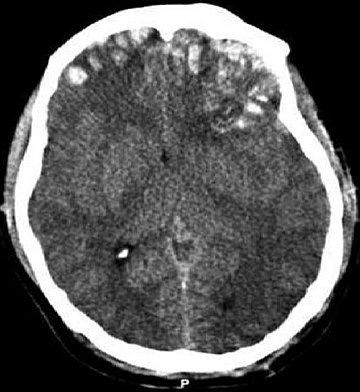Você sabia?
Você pode clicar duas vezes em uma palavra para procurá-la na TermGallery.
Você pode clicar duas vezes em uma palavra para procurá-la na TermGallery.
Significados de head jarring em inglês
russo
травма головы português
traumatismo craniano espanhol
lesión de la cabeza catalão
ferida al cap 
Traumatic injuries involving the cranium and intracranial structures.
Sinônimos
Examples for "head injury"
Examples for "head injury"
1
Methods: A 29-year-old man presented with head injury following road traffic accident.
2
Results: The medical records of 629 children with head injury were examined.
3
You could have a closed- head injury and we don't know the severity.
4
Kelly said St. Brown was being evaluated for a possible head injury.
5
The patient suffered head injury and extensive burns following a car accident.
1
The cranial trauma seemed to suggest two direct impacts, one anterior, one posterior.
2
I found rib fractures in addition to the cranial trauma.
3
The cranial trauma did not preclude the possibility of pain.
4
I would like you to examine the cranial trauma. LaManche's French, always so proper.
5
The pathologist wanted to know if analysis of the cranial trauma could resolve the question.
1
The syndrome of inappropriate secretion of antidiuretic hormone seems to us to be a frequent complication of severe craniocerebral trauma.
2
Eight patients with severe craniocerebral trauma were studied prospectively to assess the effects of the injury on sodium and water balance.
3
Surgical intervention, in the case of acute craniocerebral trauma, does not result in a higher frequency of inappropriate secretion of antidiuretic hormone.
1
Background: Propofol is commonly used to sedate patients after traumatic brain injury.
2
Participants: 77 patients admitted for their first rehabilitation after traumatic brain injury.
3
The critical care management of patients with traumatic brain injury is complex.
4
Such variability is elevated in neurodegenerative diseases or following traumatic brain injury.
5
Background: Optimal glycaemic targets for patients with severe traumatic brain injury remain unclear.
Translations for head jarring
português
catalão

